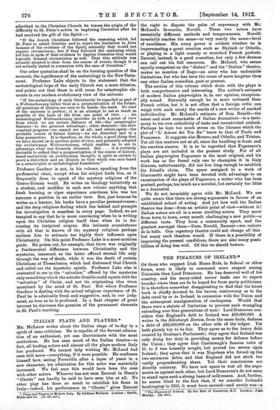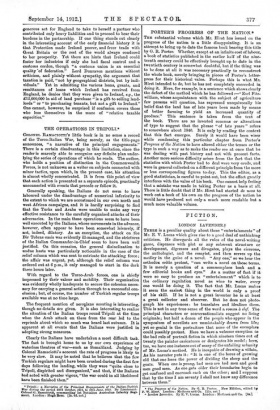THE FINANCES OF IRELAND.*
OF' those who support Irish Home Rule, in federal or other forms, none is likely to command more respect among Unionists than Lord Dunraven. He has deserved well of his country, and his many-sided career leads one to expect broader views than are to be hoped for from party politicianas It is therefore somewhat disappointing to find that his latest book is chiefly devoted to the barren controversy as to the debt owed by or to Ireland in connexion with the Union and the subsequent amalgamation of exchequers. Would that there were a statute of limitation to prevent such wrangling extending over four generations of men! Lord Dunraven con,- siders that England's debt to Ireland was £50,000,000. A writer in the Edinburgh Review, from the same facts, deduces a debt of £62,000,000 on the other side of the ledger. Yet both plainly try to be fair. They agree as to the heavy debt created by Grattan's Parliament; they agree that Ireland Wag3 only doing her duty in providing money for defence before the Union ; they agree that Castlereagh's famous ratio of 15 to 2 was honestly sought, but proved too severe upon Ireland ; they agree that it was Napoleon who forced up the two enormous debts, and that England did not shirk her vastly preponderating share. Yet their conclusions are directly contrary. We have not space to test all the argu- ments as against each other, but Lord Dunraven's do not seem to stand upon such a strong basis of cold reason. And, further, he seems blind to the fact that, if we consider Irelands bankruptcy in 1815, it must have seemed—and surely was—a • The Finances of Ireland. By the Earl of Dunraven, LP. London; John Murray. [5s. net. j
generous act for England to take to herself a partner who contributed only heavy liabilities and to proceed to bear their burdens in the partnership. If one thing stands out clearly in the interesting account of the early financial history it is that Protection made Ireland poorer, and freer trade with Great Britain or the rest of the world always conduced to her prosperity. Yet there are hints that Ireland could foster her industries if only she had fiscal control and a customs cordon, though "a customs union is an essential quality of federation." Lord Dunraven mentions without criticism, and plainly without sympathy, the argument that taxation is paid, "not by geographical districts, but by indi- viduals." Yet in admitting the various loans, grants, and remittances of loans which Ireland has received from England, he denies that they were given to Ireland, e.g., the £12,000,000 in aid of land purchase "is a gift to selling land- lords" or "to purchasing tenants, but not a gift to Ireland." One cannot, however, be surprised if confusion covers those who lose themselves in the maze of "relative taxable capacities."







































 Previous page
Previous page